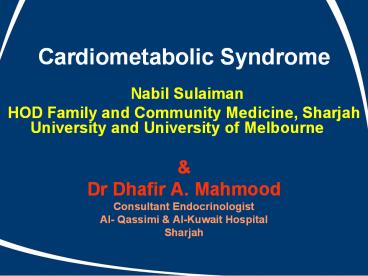Cardiometabolic Syndrome PowerPoint PPT Presentation
Title: Cardiometabolic Syndrome
1
- Cardiometabolic Syndrome
- Nabil Sulaiman
- HOD Family and Community Medicine, Sharjah
University and University of Melbourne - Dr Dhafir A. Mahmood
- Consultant Endocrinologist
- Al- Qassimi Al-Kuwait Hospital
- Sharjah
2
Cardiometabolic Syndrome IIAims
- Abdominal obesity prevalence
- Targeting Cardiometabolic Risk factors
- Multiple Risk Factor management
- A Critical Look at the Metabolic Syndrome
3
Clustering of Components
- Hypertension BP. gt 140/90
- Dyslipidemia TG gt 150 mg/ dL ( 1.7 mmol/L )
- HDL- C lt 35 mg/ dL
(0.9 mmol/L) - Obesity (central) BMI gt 30 kg/M2
- Waist girth gt 94 cm
(37 inch) - Waist/Hip ratio gt 0.9
- Impaired Glucose Handling IR , IGT or DM
- FPG gt 110 mg/dL
(6.1mmol/L) - 2hr.PG gt200
mg/dL(11.1mmol/L)
- Microalbuninuria (WHO)
4
Global cardiometabolic risk
Gelfand EV et al, 2006 Vasudevan AR et al, 2005
working definition
5
International Diabetes Federation (IDF) Consensus
Definition 2005
- The new IDF definition focusses on abdominal
obesity rather than insulin resistance
6
Why a New Definition of the MeS IDF Objectives
- Needs
- To identify individuals at high risk of
developing cardiovascular disease (and diabetes) - To be useful for clinicians
- To be useful for international comparisons
7
Central Obesity
- IDF
- Central obesity - waist circumference gt94 cm for
Europid men, gt80 Europid women with ethnicity
specific values for other groups - WHO
- Waist-hip ratio gt0.9 - men or gt0.85 - women
- ATP III
- Waist circumference gt40 in. - men,
- gt 35 in. -
women
8
Fat Topography In Type 2 Diabetic Subjects
Intramuscular
Subcutaneous
Intrahepatic
Intra- abdominal
9
Abdominal obesity and increased risk of
cardiovascular events
The HOPE study
Men
Women
Tertile 1
lt95
lt87
Waistcircumference (cm)
Tertile 2
95103
8798
Tertile 3
gt103
gt98
1.4
1.35
1.29
1.27
1.17
1.16
1.2
1.14
Adjusted relative risk
1
1
1
1
0.8
CVD death
MI
All-cause deaths
Adjusted for BMI, age, smoking, sex, CVD disease,
DM, HDL-cholesterol, total-C CVD cardiovascular
disease MI myocardial infarction BMI body
mass index DM diabetes mellitus HDL
high-density lipoprotein cholesterol
Dagenais GR et al, 2005
10
Abdominal obesity increases the risk of
developing type 2 diabetes
24
20
16
12
Relative risk
8
4
0
lt71
7175.9
7681
81.186
86.191
91.196.3
gt96.3
Waist circumference (cm)
Carey VJ et al, 1997
11
Abdominal obesity is linked to an increased risk
of coronary heart disease
Waist circumference has been shown to be
independently associated with increased
age-adjusted risk of CHD, even after adjusting
for BMI and other cardiovascular risk factors
CHD coronary heart disease BMI body mass index
Rexrode KM et al, 1998
12
Diabetes in the new millenniumInterdisciplinary
problem
- Diabetes
13
Diabetes in the new millenniumInterdisciplinary
problem
- OBESITY
14
Diabetes in the new millenniumInterdisciplinary
problem
- DIAB
- ESITY
15
- Targeting
- Cardiometabolic Risk
16
Central obesity a driving force for
cardiovascular disease diabetes
Balzac by Rodin
Front
Back
17
Intra-abdominal adiposity is closely correlated
with abdominal obesity
300
r 0.80
200
IAA (cm2)
100
IAA
0
60
80
100
120
Waist circumference (cm)
- To assess IAA, the simplest measure of abdominal
obesity is waist circumference, which is strongly
correlated with direct measurement of IAA by CT
scan or MRI, considered to be the gold standard
IAA intra-abdominal adiposity CT computed
tomography MRI magnetic resonance imaging
Després JP et al, 2001 Pouliot MC et al, 2004
18
Intra-abdominal adiposity is a major contributor
to increased cardiometabolic risk
IAA high risk fat
Dyslipidaemia
Increased cardiometabolic risk
Insulin resistance
Inflammation
IAA intra-abdominal adiposity
Kershaw EE et al, 2004 Lee YH et al, 2005
Boden G et al, 2002
19
- Waist Circumference
20
Intra-abdominal adiposity and dyslipidaemia
Triglycerides
HDL-cholesterol
310
60
248
186
mg/dL
mg/dL
45
124
62
30
0
Lean
Low
High
Lean
Low
High
Visceral fat(obese subjects)
Visceral fat(obese subjects)
HDL high-density lipoprotein
Pouliot MC et al, 1992
21
Insulin Resistance Associated Conditions
22
Targeting Cardiometaboilc Risk Defining
cardiometabolic Risk
- Cardiovascular Disease
- Abdominal Obesity
Glucose intolerance -
Insulin Resistance
- Dyslipedemia
Hypertension
23
Targeting Cardiometaboilc Risk Defining
cardiometabolic Risk
-
Major Unmet Clinical Need - Classical Risk Factors
-
Novel Risk Factors -
Cluster Risk Factors -
- LDL-C BP Smoking DM-2 Insulin
HDL-C TNF IL-6 -
Abdominal Obesity -
-
Glucose PAI-1 TG - Cardiovascular
Disease
24
Linked Metabolic Abnormalities
- Impaired glucose handling/ insulin resistance
- Atherogenic dyslipidemia
- Endothelial dysfunction
- Prothrombotic state
- Hemodynamic changes
- Proinflammatory state
- Excess ovarian testosterone production
- Sleep-disordered breathing
25
Resulting Clinical Conditions
- Type 2 diabetes
- Essential hypertension
- Polycystic ovary syndrome (PCOS)
- Nonalcoholic fatty liver disease
- Sleep apnea
- Cardiovascular Disease (MI, PVD, Stroke)
- Cancer (Breast, Prostate, Colorectal, Liver)
26
Targeting Cardiometaboilc Risk
- Site of Action Mechanisms
Addresses - Adipose tissues Adiponectin
Dyslipidemia -
Lipogeenesis Insulin resistance - Muscle G uptake
Insulin resistance - Liver Lipogeenesis
Dyslipidemia -
Insulin resistance - GI tract Satiety signals
Body weight -
Waist circumference - Hypothalamus Food intake
Body weight -
Waist circumference - Genetic?
27
Multiple Risk Factor Management
- Obesity
- Glucose Intolerance
- Insulin Resistance
- Lipid Disorders
- Hypertension
- Goals Minimize Risk of Type 2 Diabetes and
Cardiovascular Disease
28
Glucose Abnormalities
- IDF
- FPG gt100 mg/dL (5.6 mmol. L) or previously
diagnosed type 2 diabetes - (ADA FBS gt100 mg/dL 5.6 mmol/L )
29
Hypertension
- IDF
- BP gt130/85 or on Rx for previously diagnosed
hypertension
30
Dyslipidemia
- IDF
- Triglycerides - gt150mg/dL (1.7 mmol /L)
- HDL - lt40 mg/dL (men), lt50 mg/dL (women)
31
Insulin Resistance
- Hyperinsulinemic individuals are at risk for
developing Diabetes, Dyslipidemia, Hypertension
ultimately Cardiovascular disease - Patients with Metabolic Syndrome are 3.5 times as
likely to die from Cardiovascular disease
compared to normal people

